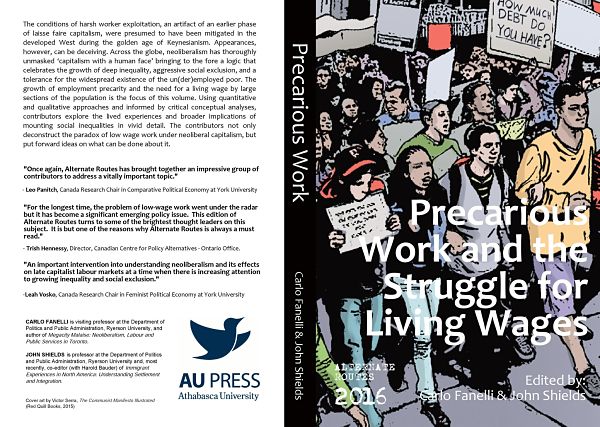‘Illegalized’ Migrant Workers and the Struggle for a Living Wage
Abstract
A higher proportion of workers are earning sub-poverty wages
today, compared to few decades ago. Illegalized migrant workers have
been disproportionately affected by this trend through super-exploitative
employer practices. To improve the wages of low-wage workers, members
of unions, community groups, activists, and support coalitions have
launched living wage campaigns in cities in the USA, UK and, more
recently, Canada. Recognizing that illegalized migrant workers’ lack of
legal status is valuable to neoliberalism’s economic “success”, yet at the
same time, subjects them to arrest and/or deportation by federal
immigration authorities, this paper examines modern living wage
campaigns, and how they have incorporated the situation of illegalized
migrant workers into their agenda. A review of the literature shows that
living wage campaigns have not been very successful in achieving their
broad goals while at the same time protecting low-waged illegalized
migrant workers. These findings indicate that current and future living
wage campaigns should consider working closely with Sanctuary City
campaigns to improve their strategies for protecting illegalized migrants
from arrest and/or deportation while working to improve the working and
living conditions of low-waged workers, including the illegalized.
Downloads
How to Cite
Issue
Section
License
Articles are published in Alternate Routes: A Journal of Critical Social Research under the Creative Commons "Attribution/Non-Commercial/No Derivative Works" Canada licence.
The copyright for the articles published in this journal is retained by the authors, with first publication rights granted to the journal. By virtue of their appearance in this open access journal, articles may be used, with proper attribution, in educational and other non-commercial, not-for-profit settings. The submission of a manuscript to Alternate Routes will be taken to mean that the author understands and agrees to the following:
- the manuscript represents original work not previously published;
- the manuscript is not being considered elsewhere for publication in the same language (publication elsewhere in an alternate language does not preclude acceptance of submission to Alternate Routes);
- appropriate written copyright permissions have been secured for republication of any copyrighted material contained in the manuscript;
- copyright for this article is retained by the author, with first publication rights granted to Alternate Routes;
- by virtue of its appearance in this open access journal, it is understood that the article is freely available for use, with proper attribution, for educational and other non-commercial purposes;
- reuse of the article for commercial purposes by anyone other than the author requires permission of the author;
- the author agrees to cite Alternate Routes as a source whenever h/she later republishes or reuses the article in other platforms.


